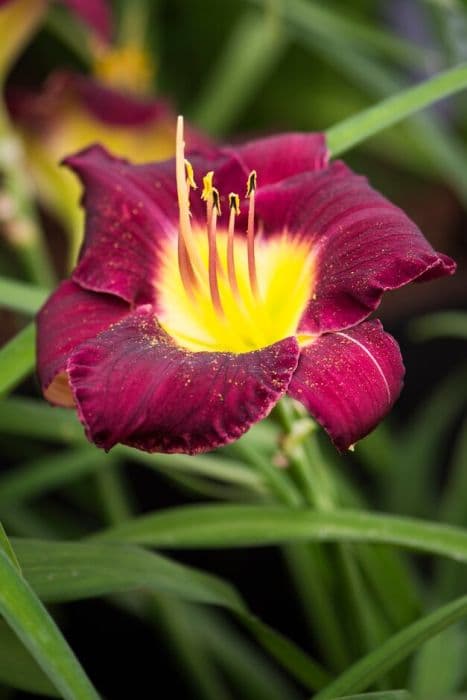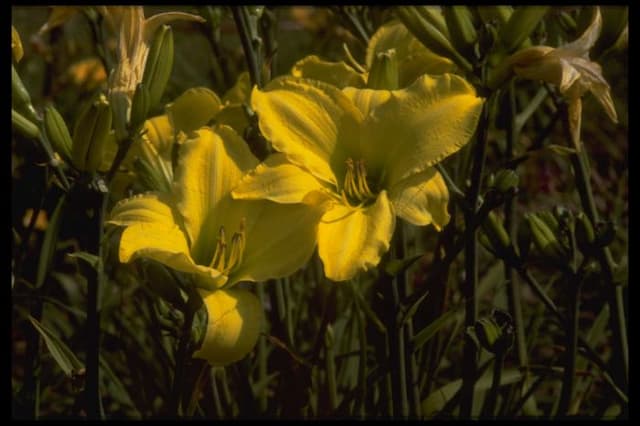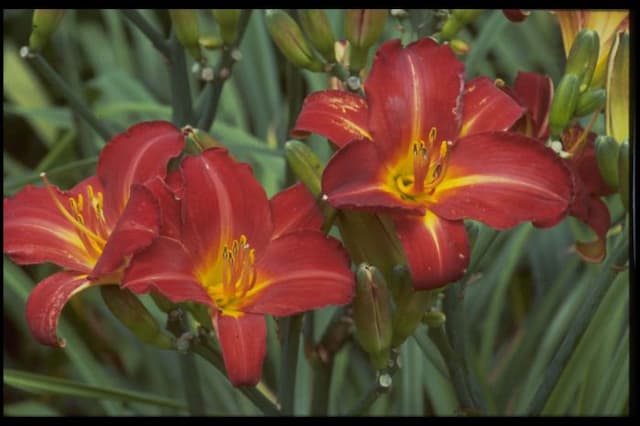Daylily Hemerocallis 'Pardon Me'

ABOUT
Hemerocallis 'Pardon Me' is a captivating daylily known for its vibrant flowers and lush foliage. The plant features a clump of long, arching green leaves that provide a verdant backdrop for its striking blossoms. The flowers themselves are a deep crimson-red hue, with each petal showing off a slightly ruffled edge that adds to their charm. At the center, a yellower throat stands out vibrantly against the red, drawing attention to the bloom's heart. These flowers appear on sturdy, slender stems that rise gracefully above the foliage. Each bloom of the 'Pardon Me' daylily typically presents a star-like form and is a bold yet elegant statement in the garden. The blooms have a luscious, velvety texture and are renowned for their ability to attract pollinators like bees and butterflies while also exhibiting a pronounced, sweet fragrance that can add another layer of enjoyment to any outdoor space.
About this plant
 Names
NamesFamily
Hemerocallidaceae
Synonyms
Daylily
Common names
Hemerocallis 'Pardon Me'
 Toxicity
ToxicityTo humans
Daylily 'Pardon Me' is generally considered non-toxic to humans when consumed in small quantities. However, ingestion of large amounts of any plant material can lead to discomfort such as an upset stomach or intestinal distress. While the daylily is commonly eaten in parts of Asia and is an ingredient in some dishes, individuals with certain sensitivities or allergies may react differently.
To pets
For pets, the daylily can be highly toxic, particularly to cats. Ingesting even small amounts can lead to severe kidney damage or potentially kidney failure, which can be life-threatening. Symptoms of poisoning in cats can include vomiting, lethargy, lack of appetite, and increased urination followed by a possible lack of urination as kidney failure progresses. If you suspect your cat has ingested daylily, seek immediate veterinary assistance.
 Characteristics
CharacteristicsLife cycle
Perennials
Foliage type
Deciduous
Color of leaves
Green
Flower color
Red
Height
1 foot 6 inches (45.72 cm)
Spread
1 foot 6 inches (45.72 cm)
Plant type
Herb
Hardiness zones
3
Native area
Asia
Benefits
 General Benefits
General Benefits- Easy to Grow: Adapts well to a variety of soil conditions and requires minimal maintenance once established.
- Drought Tolerant: Can survive periods of low water availability, making it suitable for xeriscaping or dry climate gardens.
- Long Bloom Time: Produces vibrant red flowers that can bloom continuously for several weeks, usually from early to midsummer.
- Attracts Pollinators: The colorful flowers draw in butterflies and bees, which helps in the pollination of nearby plants.
- Edible: The flowers are edible and can be used to add color and a mildly sweet flavor to salads and other dishes.
- Landscape Beautification: Adds aesthetic value to gardens and landscaping with its bright, showy flowers and grassy foliage.
- Erosion Control: The root system helps to stabilize soil and prevent erosion on slopes or in areas with loose soil.
- Low Disease and Pest Risk: Generally resistant to many common garden pests and diseases, reducing the need for chemical treatments.
- Perennial Growth: As a perennial, it returns year after year, providing long-term value and reducing the need for annual replanting.
- Propagation: Can be easily propagated by division, allowing gardeners to expand their plantings or share with others.
 Medical Properties
Medical PropertiesThis plant is not used for medical purposes.
 Air-purifying Qualities
Air-purifying QualitiesThis plant is not specifically known for air purifying qualities.
 Other Uses
Other Uses- The daylily 'Pardon Me' can be used in flower arranging or floral arts due to its vibrant color and shape, which can provide a striking contrast in arrangements.
- The petals of daylilies are edible and can be used in culinary applications, such as adding a colorful touch to salads or as a garnish for various dishes.
- Daylily flowers can be used as a natural dye source for fabrics or yarns, providing shades of yellow, orange, or red depending on the part of the plant used and the mordant.
- They can be incorporated into potpourri mixes for their shape and subtle fragrance, adding texture and color diversity to the mixture.
- Daylilies can be planted for soil erosion control on slopes or banks thanks to their extensive root system that helps to stabilize the soil.
- The plant can be used as a natural pest deterrent in gardens, as some pests are known to avoid daylilies, possibly due to their toxicity to certain animals.
- Artists may use the blooms as subject matter in botanical illustration or photography, where the intricate details and vivid colors can be depicted.
- The robustness and adaptability of daylilies make them suitable for xeriscaping, a landscaping method that reduces or eliminates the need for supplemental water from irrigation.
- In educational settings, daylilies can be used as a teaching tool to demonstrate plant biology, including the lifecycle of a perennial and the structure of a flower.
- Daylily buds and blooms can be floated in water features or bowls as a decorative element for outdoor events or as a peaceful addition to a home garden setting.
Interesting Facts
 Feng Shui
Feng ShuiThe Daylily is not used in Feng Shui practice.
 Zodiac Sign Compitability
Zodiac Sign CompitabilityThe Daylily is not used in astrology practice.
 Plant Symbolism
Plant Symbolism- Beauty: Daylilies, including Hemerocallis 'Pardon Me', symbolize beauty due to their attractive flowers and graceful form.
- Forgetfulness: The individual blooms of a daylily only last for a day, which is symbolic of forgetting the past and embracing the present moment.
- Motherhood: In Chinese culture, daylilies are associated with motherhood because they're associated with the nurturing of offspring through their abundant blossoms.
- New Beginnings: The daylily's habit of producing new flowers daily represents new opportunities, hope, and renewal.
- Longevity: Despite the individual flowers' fleeting nature, daylilies return year after year, representing longevity and the continuous cycle of life.
- Coquetry: In the language of flowers, daylilies signify flirtation or a playful behavior because of their bright and vibrant colors.
 Water
WaterDaylilies, such as 'Pardon Me', should be watered deeply once a week, providing about one inch of water which can be equivalent to roughly 0.6 gallons per square foot of soil. During hot or dry weather, increase watering to twice a week. Ensure that the soil is well-draining to prevent waterlogging. In the dormant season, reduce watering as the plant requires less moisture. It's best to water early in the morning to allow foliage to dry during the day, reducing the risk of fungal diseases.
 Light
LightDaylilies like 'Pardon Me' thrive in full sun but can tolerate partial shade. They perform best when they receive at least six hours of direct sunlight each day. An ideal spot would be in an open area that is unobstructed by trees or buildings to ensure ample light exposure. However, in extremely hot climates, a location that provides light afternoon shade can help protect the flowers from intense heat.
 Temperature
TemperatureDaylilies, such as 'Pardon Me', are hardy plants that can withstand a wide range of temperatures. They can survive minimum winter temperatures down to -30 degrees Fahrenheit, and have an upper threshold of around 90 degrees Fahrenheit before they start to experience stress. The ideal growing temperatures for daylilies are between 60 and 75 degrees Fahrenheit.
 Pruning
PruningPrune 'Pardon Me' daylilies to remove dead or spent flowers and stems to encourage reblooming and to maintain a tidy appearance. Pruning should be done throughout the blooming season as flowers fade. In late fall, cut back the foliage to a few inches above the ground after it has yellowed and died back. This helps to prepare the plant for winter and prevents disease carryover.
 Cleaning
CleaningAs needed
 Soil
SoilThe ideal soil mix for the Daylily 'Pardon Me' should be well-draining, rich in organic matter, with a slightly acidic to neutral pH of 6.0 to 7.0.
 Repotting
RepottingDaylilies, including 'Pardon Me', are typically grown outdoors and do not require repotting; divide clumps every 3-5 years to maintain vigor.
 Humidity & Misting
Humidity & MistingDaylily 'Pardon Me' tolerates a wide range of humidity levels and does not have specific humidity requirements.
 Suitable locations
Suitable locationsIndoor
Place Daylily 'Pardon Me' near bright sunlight and ensure good airflow.
Outdoor
Plant Daylily 'Pardon Me' in full sun to partial shade with well-drained soil.
Hardiness zone
3-9 USDA
 Life cycle
Life cycleThe daylily 'Pardon Me' begins its life cycle as a dormant bare root or as a division from a mature plant. After planting, the roots establish in the soil, and foliage emerges in the form of long, strap-like leaves. The plant enters a vegetative growth stage where it increases in size and number of leaves, preparing for flowering. Bloom season occurs in mid to late summer, where 'Pardon Me' produces numerous small, crimson-red flowers that typically last just one day each. After the flowering stage, the plant sets seed pods if pollination has occurred, though many gardeners deadhead to encourage further blooming and maintain vigor. As the growing season ends, the daylily enters a period of dormancy, especially in colder climates, wherein the foliage dies back and the plant rests until the next growing season.
 Propogation
PropogationPropogation time
Late Summer
Propogation: The most popular method of propagating the daylily 'Pardon Me' is through division. This perennial plant forms clumps that can be easily divided to create new plants. The best time to divide daylilies is in early spring or immediately after they finish flowering in late summer or early fall. To propagate by division, carefully dig around the clump of daylilies, and lift it out of the ground. Gently pull apart the fans of leaves, making sure that each division has at least two or three fans and a portion of the root system. Replant the divisions at the same depth they were growing at previously, spacing them about 18 to 24 inches (approximately 45 to 60 centimeters) apart to allow adequate room for growth. Water the new plants thoroughly to help establish them.









